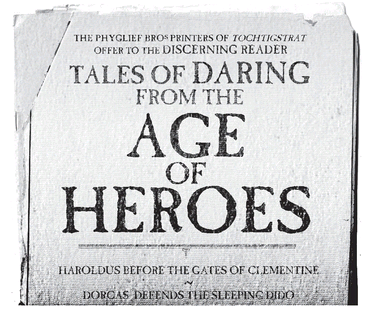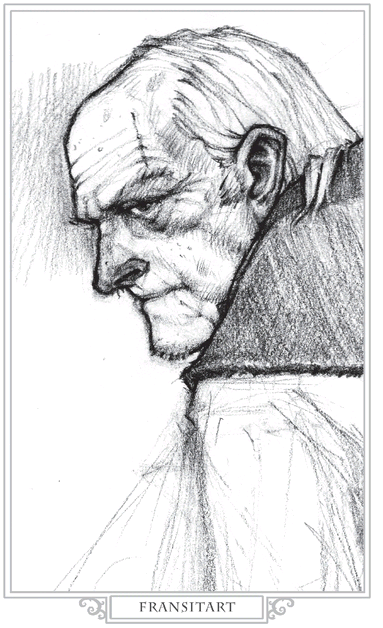Authors: D. M. Cornish
Foundling (3 page)
Better
.
.
He burped a little yellow bubble. “Thank you, MissVerline,” he gasped.
Verline told him to rest, that she would be back with a jar of water. She left again, and before she returned Rossamünd was asleep.
2

MADAM OPERA’S ESTIMABLE MARINE SOCIETY FOR FOUNDLING BOYS AND GIRLS
vinegaroon
(noun) also sailor, mariner, seafarer, mare man, bargeman, jack, limey (for the limes he sucks when out to sea), mire dog, old salt, salt, salt dog, scurvy-dog, sea dog or tar: those who work the mighty cargoes and rams that tame the monster-plagued mares and ply the many-colored waters of the vinegar seas. Such is the poisonous and caustic nature of the oceans that even the spray of the waves scars and pits a vinegaroon’s skin and shortens his days under the sun.
(noun) also sailor, mariner, seafarer, mare man, bargeman, jack, limey (for the limes he sucks when out to sea), mire dog, old salt, salt, salt dog, scurvy-dog, sea dog or tar: those who work the mighty cargoes and rams that tame the monster-plagued mares and ply the many-colored waters of the vinegar seas. Such is the poisonous and caustic nature of the oceans that even the spray of the waves scars and pits a vinegaroon’s skin and shortens his days under the sun.
T
HE great Skold Harold stood his ground. His comrades, his brothers-in-arms, had all fled in terror before the huge beast that stalked their way. This beast was enormous and covered with vicious, venomous spines. The Slothog—the slaughterer of thousands, the smiter of tens of thousands. The gore of the fallen dripped from its grasping claws as it came closer and closer. Struggling beast-handlers were dragged along as the Slothog strained against its leash.
HE great Skold Harold stood his ground. His comrades, his brothers-in-arms, had all fled in terror before the huge beast that stalked their way. This beast was enormous and covered with vicious, venomous spines. The Slothog—the slaughterer of thousands, the smiter of tens of thousands. The gore of the fallen dripped from its grasping claws as it came closer and closer. Struggling beast-handlers were dragged along as the Slothog strained against its leash.
The battle had been long and bloody. Ruined bodies lay all about in ghastly piles that stretched away as far as the eye could see. Harold had fought through it all. His once-bright armor was bruised and dented beyond repair. With great heaviness of heart he checked his canisters and satchels: all his potives were spent—all, that is, but one. It would be his last throw of the dice. He fixed the potive in his sling and, taking up the Empire’s glorious standard, cried, “To me, Emperor’s men! To me! Stand with me now and win yourself a place in history!”
But no one listened, no one halted, no one returned to his side to defend his ancient home.
Alas, now, the Slothog was too close for escape. It paused for a brief and horrible moment. Slavering, it regarded Harold hungrily with tiny, evil eyes. Then, with a bellow it shook off its panicking handlers and charged.
With a cry of his own, lost in the din of the beast, Harold swung up his sling and leaped . . .
“Young Master Rossamünd! What rot are yer readin’?”
Fransitart, the dormitory master of Madam Opera’s Estimable Marine Society for Foundling Boys and Girls, stood over Rossamünd as he sat in a forlorn little huddle, tucked up in his rickety bunk. A great red welt showed on his left cheek and right down his neck. Gosling had done his work well.
The boy looked sheepishly at Master Fransitart as he pressed the thin folio of paper he had been reading against his chest, creasing pages, bending corners. He had been so taken by the tale that he had not heard the dormitory master’s deliberate step as he had approached Rossamünd’s corner down the great length of the dormitory hall.
“It’s one of them awful pamphlets Verline buys for yer, bain’t it, me boy?” Fransitart growled.
It was the old dormitory master who had found him those years ago: found him with inadequate rags and rotting leaves for swaddling, that tattered sign affixed to his tiny, heaving chest. Rossamünd knew the dormitory master watched out for him with a care that was beyond both his duty and his typically gruff and removed nature. Rossamünd did not pause to wonder why: he simply accepted it as freely as he did Verline’s tender attentions.
The foundling nodded even more sheepishly. The gaudily colored title showed brightly on the cover:


He had woken a little earlier, after recovering from his dose of birchet, to find the pamphlet sitting on the old tea chest that served as a bedside table. Every second Domesday, when Verline was given a little time to herself, she bought them for the children from a shady little vendor on the Tochtigstrat. Today was Midwich—the day before Domesday. This particular issue must have been brought to him as a special comfort, and Rossamünd had snatched it up eagerly.
The dormitory master folded his hands behind his back. “What will Master Pinsum think of me findin’ ye readin’ these things again?”
Master Pinsum was one of Rossamünd’s instructors. He taught the foundlings matters, letters and generalities—that is, history, writing and geography. Rossamünd found it endlessly fascinating that, whenever Master Pinsum declared this about himself, he would wave his right hand theatrically, as was done in gala-plays, and
rrrrolll
his
R
’s with equal drama.
rrrrolll
his
R
’s with equal drama.
“I’m not much for me letters, as ye know, lad,” Fransitart continued, with a cheeky twinkle in his eye, “but Master Pinsum ’as led me to thinkin’ that readin’ these ’ere pamphlets will shrivel yer mind. Let’s just say ’tis a good thing ye’re recuperatin’ from th’ beatin’ that spineless-braggart-of-a-child Gosling gave ye—else I might ’ave to consider con-fer-scatin’ that there folio.” He rocked back on his heels and regarded the luminous cover. “What’s this ’un about, me lad?”
Rossamünd grinned. “The Great Skold Harold, Champion of the Empire and Savior of Clementine!”
“Ahh.” Fransitart stroked his clean-shaven chin. “Ol’ ’Arold, is it? Slayer of a thousand monsters in th’ Battle of th’ Gates, Savior of th’ Imperial Capital? That were a powerful long time ago—a bit of ancient ’istory. Wonder ’ow true that version ye got there is, though?”
“Why wouldn’t it be true?” Rossamünd looked horrified.
Fransitart shrugged. “Per’aps ’cause fabrications are easier to sell and more entertainin’ to read.” He leaned in a little. “Or per’aps it’s a bit o’ propaganda for th’ skolds, so we’ll like ’em better.”
“Well, I already think skolds are amazing! Would you want to be a skold, Master Fransitart? I wish that I was . . . that—or a vinegaroon, of course.”
For over fifteen centuries skolds had fought the monsters, so Rossamünd had been taught. Indeed, they had made it possible for civilization to endure. They made and used all sorts of powerful, strange and deadly chemicals to slay monsters or drive them off. They also sold many of these potives and concoctions to everyday folk, allowing them to stand against the monstrous foe as well. Skolds were deeply respected, but they were also thought strange and—it was said—they usually stank of the very chemicals in which they trafficked. Though Rossamünd had seen many, he had never been close enough to confirm this reputation.
“A skold? One of those dark dabblers makin’ all those dangerous smells and vile potions just waitin’ to go boom in yer face? Wanderin’ about, confrontin’ all th’ beasts and nasties out there?” The dormitory master gestured vaguely. “I be thinkin’ not.” He sighed. “Folks needs ’em to keep all manner of nasties away, I grant ye, but a skold will spend their days out in th’ wild countryside where only their cunnin’, their chem’stry and th’ cut of their proofin’ stand between their next meal and an ’orrible, gashin’ end! I’ve ’ad perils enough in me life and prefer to spend what’s left of it safe in these ’alls, behind th’ city’s many walls. And ye’ll ’ave dangers a-plenty when ye go to serve on a main-ram. A-skoldin’s not for me, lad, or thee either, if ye know what’s right fer ye.”
“Would you rather be a lahzar, then?” Rossamünd ventured, already knowing the answer.
Of strange people, lahzars were thought the strangest. Able to do wonderful, terrible things because of secret surgeries done on their bodies, they too fought monsters. Some even said they were better at this than the skolds. There were two kinds of lahzar: fulgars—who could make sparks and flashes of electricity; and wits—who could twist and squash minds, and could sense where monsters and even people were hiding. No one knew exactly whence lahzars had come, but for the last two centuries they had made a profound difference to teratology—the proper term for monster-hunting. Skolds were bizarre, but lahzars could be frightening—almost as frightening as the beasts they fought.
Fransitart squinted and sucked in a breath. “Abash-me, lad, now I’m certain ye’re goadin’ me! To let a butcherin’ surgeon go carvin’ into yer rightly ordered gizzards and guts . . . What’s the use of it? I’m with th’ skolds—they were doin’ a fine job of th’ killin’ and th’ slayin’ and th’ lordin’ over we lesser folks for centuries afore them lahzars came along. Give me a skold over a lahzar on any given day, bless me eyes!”
Nickers and bogles were the names most folk gave to the monsters: nickers for the bigger ones, bogles for the smaller, though this rule wasn’t fixed. Rossamünd closed his eyes as he tried to imagine a lahzar battling with some giant nicker.
The dormitory master sat down on the end of Rossamünd’s sagging cot, rousing him. Fransitart gave the boy a serious look. “I ’ave ’ad to share cabin space with a few lahzars in me time, yer see: both th’ lightnin’-graspin’ fulgar and head-blastin’ wit . . .”
“You have?” Rossamünd sat up. He had heard many of the dormitory master’s tales, tall and true, but Fransitart had never told him this before. “What were they like, Master Fransitart? Did you see the marks on their faces? Did they fight any monsters?”
“Aye, I ’ave, and aye, their spoors on their foreheads were clear, and aye, they did fight with as many nickers as they found and did many worse things too . . . and after each meeting I was always mightily glad to be free of their comp’ny.”
Fransitart looked at his feet for a moment. Rossamünd wondered what he was remembering.
“They are strange,” he went on finally, “and th’ unnatural organs within their bodies that make ’em so strong make ’em crotchety, feverish! Many a queer thing I ’ave seen, but nothin’ quite so wretched as a lahzar made sick by ’is organs.” He stared intently at Rossamünd. “My masters, lad, neither thee nor me wants to become one of them. Stick to a vinegaroon’s life—’tis a good, ’onest way to chance yer fortune.”

“Well then, tell one of
your
stories,” Rossamünd persisted, his pamphlet forgotten for the moment, “of when you were a sailor upon the seas. Tell me about the Battle of the Mole, when you were saved by that white-haired fellow. Or when you fought against the pirate-kings of the Brigandine! Or when you captured that Lentine grand-cargo as a prize!”
your
stories,” Rossamünd persisted, his pamphlet forgotten for the moment, “of when you were a sailor upon the seas. Tell me about the Battle of the Mole, when you were saved by that white-haired fellow. Or when you fought against the pirate-kings of the Brigandine! Or when you captured that Lentine grand-cargo as a prize!”
“Nay, nay, me boy, ye know ’em mostly already, especially them there second two . . .” The dormitory master lapsed into silence.
Rossamünd became quiet for a moment too, inspecting an illustration of Harold battling the Slothog on a page of his pamphlet. In the drawing the skold looked as if he was about to be trampled.
Fransitart stood.
The boy looked up at his dormitory master shyly. “Master Fransitart . . .” he ventured. “Have
you
ever killed a monster?”
you
ever killed a monster?”
For a moment, Fransitart seemed almost angry at this question and Rossamünd immediately regretted asking it. Old salts like the dormitory master could be very touchy about their past, and it was proper never to ask but always wait to be told.
With the deepest sigh, the saddest sound Rossamünd had ever heard Master Fransitart give, the fury passed. “Aye, lad,” he said hoarsely, “I ’ave.”
Other books
Murder for Millions (Sky High Pies Cozy Mysteries Book 7) by Mary Maxwell
Saxon Fall by Griff Hosker
Sins of the Fathers by Sally Spencer
Night Winds by Gwyneth Atlee
Arousing Amelia by Ellie Jones
Not the Marrying Kind (Destiny Bay Romances - Forever Yours) by Conrad, Helen
Things We Know by Heart by Jessi Kirby
Nothing But the Truth by Kara Lennox
Half Lies by Sally Green
Seductive Chaos (Bad Rep #3) by A. Meredith Walters
